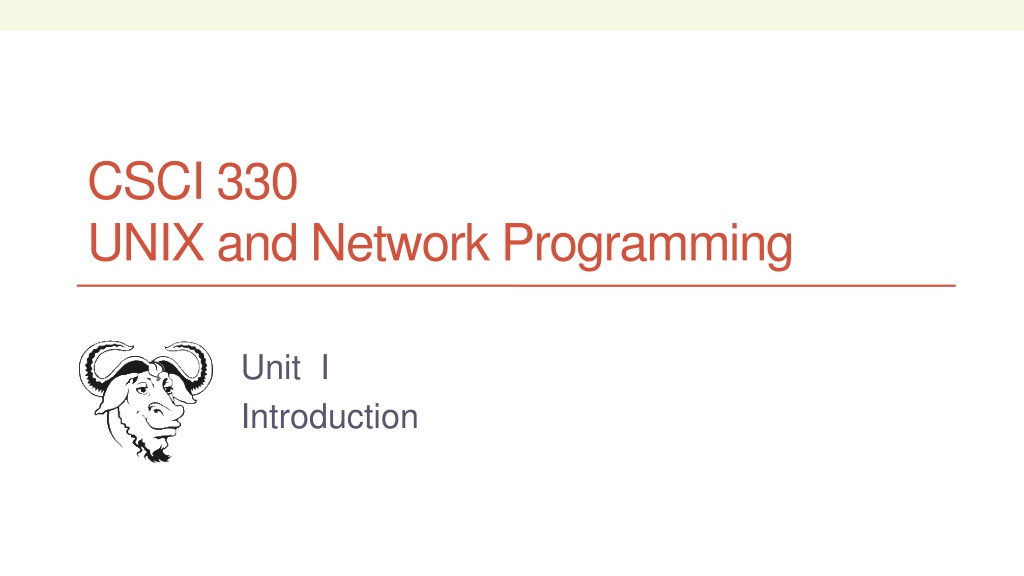
CSCI 330 UNIX and Network Programming Overview
"Learn about CSCI 330 UNIX and Network Programming course including Unix system usage, commands, shell scripting, network programming concepts, and protocols. Explore course content, instructor details, required materials, and grading criteria."
Download Presentation

Please find below an Image/Link to download the presentation.
The content on the website is provided AS IS for your information and personal use only. It may not be sold, licensed, or shared on other websites without obtaining consent from the author. If you encounter any issues during the download, it is possible that the publisher has removed the file from their server.
You are allowed to download the files provided on this website for personal or commercial use, subject to the condition that they are used lawfully. All files are the property of their respective owners.
The content on the website is provided AS IS for your information and personal use only. It may not be sold, licensed, or shared on other websites without obtaining consent from the author.
E N D
Presentation Transcript
CSCI 330 UNIX and Network Programming Unit I Introduction
CSCI 330 - UNIX and Network Programming 2 Overview of Today s class Syllabus Access to a UNIX system History of UNIX Modern UNIX/Linux
CSCI 330 - UNIX and Network Programming 3 CSCI 330 UNIX and Network Programming Catalog Description: UNIX system usage and commands. Shell script programming. Network programming concepts and protocols. System call level and basic network programming in C++. Extensive laboratory work. Prerequisites: CSCI 240 - Computer Programming in C++
CSCI 330 - UNIX and Network Programming 4 Course Content Basic UNIX system usage: file system, editors, commands C++ programming: file access, permissions Shell programming System level C++ programming Networking, TCP/UDP concepts: sockets C++ network programming: TCP/UDP Awk & sed programming UNIX Administration
CSCI 330 - UNIX and Network Programming 5 How to reach us Instructor: John Berezinski Office: PM 354 Hours: Mo/We 1pm to 2pm, or by appointment Email: berezin@cs.niu.edu TAs:
CSCI 330 - UNIX and Network Programming 6 Course Materials 8GB USB memory stick (required): formatted for NTFS (not FAT32) file system to hold the virtual disk image for Linux Textbook (optional): A Practical Guide to Linux, Mark Sobell, Prentice Hall Online notes faculty.cs.niu.edu/~berezin
CSCI 330 - UNIX and Network Programming 7 Grading The course website resides within the NIU Blackboard systems. Students are responsible for checking announcements regularly. The course features quizzes (online via Blackboard), assignments (no late assignments will be accepted), one midterm and one final exam (no make-up exams allowed, unless arranged with instructor in advance). The final exam will be held December 9 according to the official NIU final exam schedule. The following weights will be used in determining your final grade: 10% quizzes, 40% assignments, 20% midterm exam, 30% final exam. The following thresholds will be used in computing your course grade: A 93%, A- 90%, B+ 86%, B 83%, B- 80%, C+ 76%, C 70%, D 60%, F less than 60%
CSCI 330 - UNIX and Network Programming 8 Access to UNIX System we will run individual Linux system via virtualization software VMware Player installed on Lab computers download your own: vmware.com/player stored on 8GB USB memory stick formatted with NTFS
CSCI 330 - UNIX and Network Programming 9 More ways to get to a UNIX System use CSCI servers turing.cs.niu.edu or hopper.cs.niu.edu login via remote secure shell, e.g. putty install your own Linux system on spare machine as dual boot Apple MacOS X
CSCI 330 - UNIX and Network Programming 10 History of UNIX Invented by Ken Thompson at Bell Labs in 1969 first version written in assembly language single user system, no network capability Thompson, Dennis Ritchie, Brian Kernighan rewrote Unix in C Unix evolution: Bell Labs, USL, Novell, SCO BSD, FreeBSD, Mach, OS X AIX, Ultrix, Irix, Solaris, Linux: Linus Torvalds Newest: Linux on portables: Android
CSCI 330 - UNIX and Network Programming 11 What Can UNIX Do for You ? User Tools text processing (vi, sed, awk) productivity applications (web, mail, chat) entertainment (music, video) Programmer Tools scripting: sh, awk, sed, perl compilers (C, C++, Java) programming tools: geany, eclipse source code control systems E-commerce server mail server web server application server database server
CSCI 330 - UNIX and Network Programming 12 Components of UNIX Distribution ?
CSCI 330 - UNIX and Network Programming 13 Linux Distributions Redhat Fedora Debian Ubuntu Mint Suse OpenSuse www.distrowatch.com
CSCI 330 - UNIX and Network Programming 14 Linux Mint Tour
CSCI 330 - UNIX and Network Programming 15 Summary Syllabus Access to a UNIX system History of UNIX Modern UNIX/Linux





